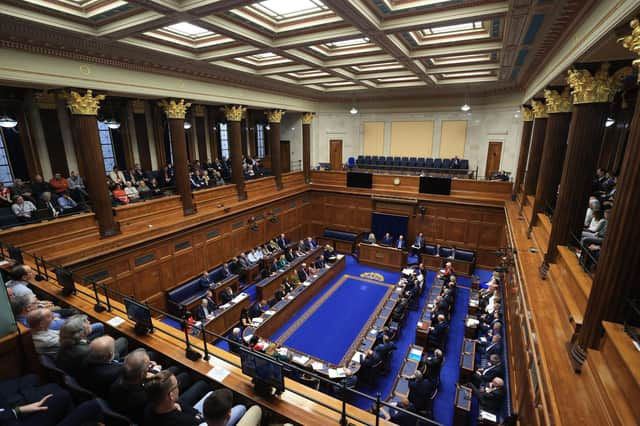Owen Polley: Any attempts to create a feel-good factor around Stormont’s return and Donaldson’s agreement have been destroyed


It’s still difficult to think through the political consequences of this news, because it was so unsettling, but that is the task that unionists face.
Donaldson’s resignation in these circumstances could easily become another trauma for unionism, which has already suffered the indignity of being cut off from the rest of the UK by a sea border. That’s certainly an impression that nationalists will try to encourage. But, as Ben Lowry suggested in his column over the Easter weekend, it could also cause unionists to have an overdue rethink of their strategies and perhaps even realign.
Advertisement
Hide AdAdvertisement
Hide AdThe DUP, it appears, is not considering an immediate change of direction.
There is not expected to be a challenge to the position of its interim leader, Gavin Robinson MP, who was installed as a continuity candidate almost as soon as Donaldson resigned. The ‘traditionalist’ wing of the party is thought to be trying to secure the deputy leader’s post, but, as this newspaper reported last week, that will probably not involve mounting any opposition to the Safeguarding the Union deal.
None of that means that the DUP will emerge politically unscathed from Donaldson’s arrest.
Sir Jeffrey’s Westminster seat in Lagan Valley must be vulnerable at the forthcoming general election, particularly if nationalists vote strategically for the Alliance candidate, Sorcha Eastwood. The DUP will be under pressure to announce a new candidate for the constituency soon and that could involve weakening its assembly team. Similarly, Gavin Robinson is defending only an 1,800 vote majority in East Belfast and defeat would surely mean a premature end to his leadership.
Advertisement
Hide AdAdvertisement
Hide AdThe party will no doubt appeal to ‘unionist unity’, in an attempt to limit any electoral damage. But, in these circumstances, it’s hard to see how the DUP’s campaign can be anything other than defensive and dispirited.
No unionist wants fewer unionist MPs, more Alliance seats or Sinn Fein claiming another election victory. At the same time, the DUP’s critics point out that the party’s leadership of unionism has hardly strengthened Northern Ireland’s place in the UK. They argue that it is time for a change.
Even if we consider only the past few years – and set aside high-profile controversies like RHI, Ian Paisley Jnr’s parliamentary suspension and now Donaldson’s arrest – the party made a thorough mess of its confidence and supply agreement with the Tories. It then endorsed Boris Johnson’s proposal for a regulatory border in the Irish Sea, suggested initially that even a customs frontier had no constitutional consequences and now claims to have removed checks and formalities, even while border posts are still being built.
It was arguably this litany of misjudgements, missteps and misunderstandings, in league with weak British negotiations, that caused Northern Ireland to be cut off from the rest of the UK and aligned with Brussels and Dublin in the first place.
Advertisement
Hide AdAdvertisement
Hide AdIt might be that rival unionist parties would not have done any better. But there were certainly voices from within the UUP, the TUV and unionism more widely highlighting what was going on throughout the negotiation process, even while DUP politicians were issuing blustering denials or boasting about their so-called achievements.
When Donaldson took over the party leadership, the boycott of Stormont was a belated attempt to put right the DUP’s inept handling of the Irish Sea border to that date. However, there was always a risk that, the longer power-sharing was suppressed, the more this strategy would look like failure.
Donaldson later decided that staying out of the assembly and executive would cause even more damage to the Union and start to undermine people’s faith in Northern Ireland as a political entity. That was a serious argument, but it was weakened by an almost comical insistence that his deal with the government removed the Irish Sea border, abolished checks on goods and stopped an automatic pipeline of EU law, despite incessant evidence to the contrary.
Now, any attempts to create a feel-good factor around Stormont’s return and Donaldson’s agreement have been completely and irrevocably destroyed. The TUV has understandably described the deal as ‘tainted’. All Donaldson’s high-handedness to his critics, his arrogance and lectures, look equally rotten.
Advertisement
Hide AdAdvertisement
Hide AdA re-think for unionists need not necessarily involve collapsing power-sharing again, but it should entail more honesty about the limitations of the deal and the scale of the problems they face. No matter how earth-shattering the news, those challenges are going nowhere and cannot be ignored.
It is impossible to deny that our society is changing in ways that are difficult to accept or understand, and unionists must find a way of navigating this landscape while continuing to attract support. But equally, while the Irish Sea border will probably not be removed quickly or completely, the longer-term aspiration for any pro-Union politician has to be to repair the damage it caused to our place in the UK.
It’s still difficult currently to envisage a revamped DUP, a rival unionist party, or even some new alignment facing these challenges and overcoming them successfully. But the upcoming general election should at least make the future direction of unionism a little clearer.